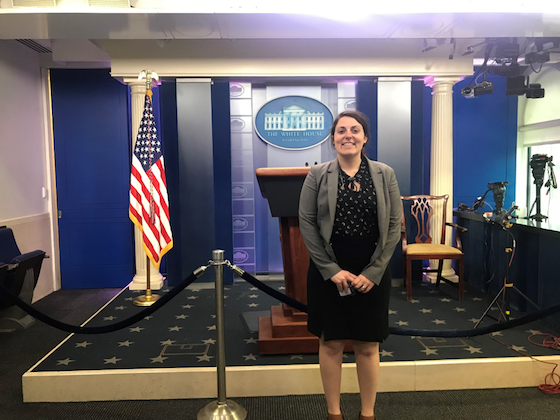I have been involved in active scientific research for more than five years and the majority of my doctoral work focused on highly politicized topics within the oceanic environment (Deepwater Horizon disaster, Gulf hypoxia, methane emissions in the Arctic, etc.). Therefore, the intersection between science and policy has always intrigued me. This curiosity ultimately led me to the John A. Knauss Marine Policy Fellowship, a year-long fellowship sponsored by the National Sea Grant College Program that provides graduates students the opportunity to work on ocean and coastal issues within legislative and executive branches of the federal government. I’m now eight months in to this once-in-a-lifetime
fellowship, and I’ve gained a broad view of ocean
policy and made many connections within the federal government.
Most people associate the Knauss Fellowship with a placement in the National Oceanic and Atmospheric Administration, but I’ve had the wonderful opportunity of being placed within the Department of the Navy under the Oceanographer of the Navy. I am serving as the interagency and international policy liaison within the office, which means I attend a wide variety of meetings on topics ranging from battlespace awareness, climate and national security, coastal infrastructure, maritime transportation, hypoxia and harmful algal blooms, ocean acidification, and ocean and coastal mapping. During these meetings, my job is to speak to the contributions that the Navy is making towards efforts related to these topics. I also serve as a science expert and contribute to White House ocean policy documents, Department of the Navy reports to congress, and internal Department of Defense strategies. I frequently advise and attend Cabinet-level ocean policy meetings with the Oceanographer and other senior executives.

The lawn at the U.S. Naval Observatory.
Working in D.C. can be overwhelming and stressful, but my office is located on the Naval Observatory, which is a lovely oasis of green grass and bounding deer in the heart of the city. I find that taking a mid-day walk across the grounds really provides a great brain break when you are feeling stressed. The Naval Observatory is also home to a multitude of telescopes, first edition 14th century scientific logs, and the Master Clock, which provides precise time to the GPS satellites that run the GPS you use every day. The primary mission of the Naval Observatory is to produce Positioning, Navigation, and Timing for the U.S. Navy and the Department of Defense.
Through this fellowship, I’ve gained insight in many different areas, thus being able to expand my knowledge base and identify my areas of interest within the federal government. Being able to bridge the gap between science and policy has been incredibly rewarding. This specific placement has given me a rare view of ocean and science policy that many people aren’t exposed to right out of graduate school.
During our time in D.C., Knauss Fellows are able to take advantage of many professional and social development activities. We get the opportunity to visit and learn about the work of other agencies and non-governmental organizations so that we can determine what areas we might want to pursue after the fellowship. I hope that many other graduate students in Georgia are able to benefit from the Knauss Fellowship, given the increasing importance of having more scientific knowledge to back ocean policy as the world climate continues to change.

2018 Knauss Fellows at Capitol Hill during Ocean Week 2018.

